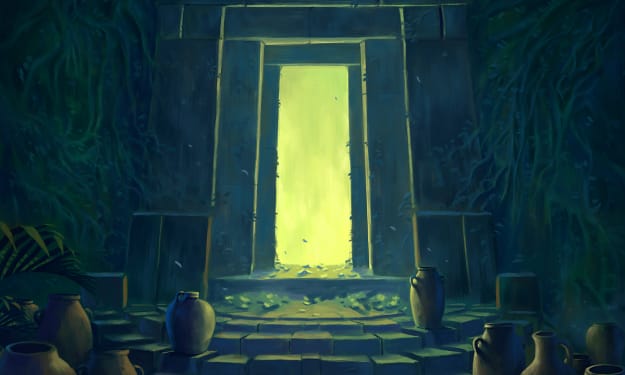The Progressively Blind

Pre-amble
The quest for peace and transcendence beyond the human condition is a theme within political science. At every turn there is another starting condition. Nature being remade over and over again only to be remade in the same likeness.
“All great world-historic facts and personages appear, so to speak, twice, the first time as a tragedy, and the second time as farce” (Marx, chap. 1, para. 1).
Marx is originally talking about revolutions but, the quote can be applied to show how political theorists revolutionize their conception of nature but, never seem to depart from the shadows on the wall of the past. Stuck in humanity’s cave where we feel most comfortable and detached from the outside world. The cave itself representing the start of humanity’s perceived separation from the rest of nature. Nature then being dressed up from an ego’s nest: nasty, brutish, and short, maybe morally neutral and peaceful, or rather that which separates mankind by labor. Each one, although differently draped, still advancing the conception of a bourgeois humanity, which consolidates its power over nature as to never lose grip of it all together. Bourgeois humanity always redefining nature as a way to keep nature as a justifiable resource. Making concession at times of nature’s importance but, always in regards to its use, impact, or role in the development of “human nature”. As if from the start, the fact of humanity, presupposes the use and inherent divergence from the rest of the natural world. The subordinate role of nature being at first indeed a tragedy and every subsequent time after, a farce. “The tradition of all dead generations weighing like a nightmare on the brains of the living” (Marx, chap. 1, para. 2) The nightmare of nature replaying daily! Human progress free falling, ignorant of its wings; preferring death over the association with the birds of paradise.
Intro
The Mushroom at The End of The World embarks on a journey to explore how a specific progressive human understanding of nature is created off the back of a patchy interconnected reality of nature. The idea of Salvage Accumulation being at the core of the relationship between Homo Sapien (wise man) and every other being and/or object. First we will start with Tsing’s main concept of Salvage Accumulation in order to move into a conversation about how Salvage Accumulation gives the discipline a robust term to identify the roots of capitalist accumulation. The paper then Cascades into the question of what it means to live in our own ruination now armed with the knowledge that nature moves on in co-operation with humanity.
We can learn from the natural world that our own development like the rest is not readily adapted into a story book, nor an event, but part of a greater superstructure that is interconnected. The goal is to use the concept of Salvage Accumulation in order to highlight that humans try to navigate a straight line while wearing a blindfold, high-fiving each other at the intersection of their perpetual blind orbits. The blind perceiving movement and progress in folly, reassured only by the other blindly circling, each only knowing how far they have gone in regards to each other, Ignoring the room itself: walls and all.
Salvage Accumulation
We need to challenge ourselves to imagine a world where progress is patchy with several powerful currents running at a time. Thus the accumulation and concentration of wealth being possible because of value produced in patches. In this view humans are not in the drivers seat of progress but mere beneficiaries of greater processes. And yet, humans themselves are part of the process of circumstance, environment, and time period. Nature is not a romanticized space for anti-mondernity… Nature is modernity.
Romanticizing nature allows for the commodification of it to attain the modern. This alienation of nature is a self-imposition. Because only through alienation can humanity imagine its ability to stand alone, “as if the entanglements of living did not matter” (Tsing 5).
It is the “Unconscious privilege that allows us to fantasize, counter-factually, that we each survive alone” (Tsing 29).
Salvage accumulation allows us to identify that unconscious privilege in our capitalist accumulation. Salvage accumulation being defined as the act of taking advantage of value that was produced without capitalist control. For example, coal and oil came into existence well before capitalists. Capitalists also cannot produce human-life. Additionally, both the conversion of indigenous knowledge into capitalist returns and the conversion of whale lives into investments are examples of salvage. Salvage accumulation puts a word to all the processes that make capitalist productive labor possible. In Mies feminist work: Patriarchy and accumulation on a world scale: women in the international division of labour she struggles to find a non-colonized term, salvage accumulation would fit her descriptive needs perfectly (47-48). Salvage accumulation allows us to politicize nature and to recognize it in human achievement. Not as resource, but rather as partner that shares in our capitalist ruination that is reality.
Without recognizing this deeper layer to human survival we maintain a view that survival is synonymous with conquest and expansion (maximization, indivisualism, and self interest). With salvage accumulation humanity can start to understand that staying alive requires livable collaborations, which means working across time, space, and species.
Recognizing salvage accumulation is also useful in developing histories which include contamination of histories of encounter. Purity from nature is not an option. Contamination makes diversity and that contaminated diversity is organized in units of collaborative encounters. These units not being self-contained, makes it impossible to compute costs and benefits for any one unit involved. This interpretation of a dynamic world takes time to understand which is often the barrier to even trying. If we ignore salvage accumulation in human development we blind ourselves to the real relationship between nature and us, misconstruing what progress is and how it is achieved… Mankind not in a state of progress but, together as a part of nature, in the state of ruination.
Living in Ruination
“Ultimately tales of progress nor ruin tell us how to think about collaborative survival” (Tsing 19). We need to live in the precarity and not imagine progressing past it. The need to move past the “natural state” is indicative of our complete misinterpretation of nature and ourselves. Like the mushrooms in the book that grow in the wake of deforestation we must grow out of our own ruined capitalist industrial sites (cultural or otherwise).
Our IR world is not one of progress but one of ruination where something truly spectacular can grow in the conditions of this capitalist ruination. States should see each other as living in the messes propagated by each other created under the pressures of progress. Without recognizing that, from ruination comes the next phase of life, we confuse our human efforts to progress by domination. Yet, whenever there is domination (confused with progress), humanity cries from the roof tops celebrating the conquest of mankind once again in its destiny to absolute greatness. To get off the hamster wheel of progress, humanity must identify it. Only then can we realize the paths to progress that don't keep us bound to the function of exercise.
Conclusion
Nature is not separate from the concept of the human, and humans are not defined in contrast to it. There is no line that delineates humans as animals vs humans as conscious. The attempt to create such a dichotomy is the labor of humanity to avoid living in the world of its own capitalist ruination. A world which is not neutral, benevolent, or brutish. It is a world that humans are a part of, and just like humanity, nature cannot be defined simply either. Salvage accumulation as a concept allows us to see how human survival is interconnected in a cooperative life. We constantly salvage from each-other and nature in order to prop up other types of capital accumulation. This salvage is not the exploitation of wage work or labor through the domination of the means of production. Salvage labor is the vital backdrop which is always flexible and conscious of changes. Constantly balancing itself to our actions in order to continue the existence it has always persisted in.
Thus, nature’s continuation in ruination allows for the illusion of human progress. Humanity by seeing itself also within said ruination could learn to infinitely persist in the same way. But, if we continue to walk blindly, then nature will continue, as it always has, maintaining and reacting without the need for the alienating human concept of progress as a means to life.
Humanity has the power to take off its blindfolds to see its progressive free fall, realizing in that moment that its not in a room at all, rather plummeting. Only then giving us the courage to take flight onto paradise… A new tragedy to facade.
Afterword: The majority of the ideas and terms are paraphrased to the best of my ability from Tsing’s book: The Mushroom at The End of The World. I am grateful for her work as it allows scholars like me to start from where she left off. Standing on the shoulders of giants. I have tried to give her ideas my own style and interpretation while staying true to her conceptual pillars. Specifically this essay seeks to explore the repetitive definitions of nature that, at times explicitly, while other times implicitly distinguishes humanity from its environment. Additionally I try to hint at the nature/human relationship as a replication of another master slave relationship like the one described in Marxism using the verbiage of bourgeoisie and proletariat. Humanity being the Bourgeois that always reshuffles but, never changes its exploitative relationship with the proletariat (nature). Sometimes siding with it when necessary to remain dominant over it. Regardless, if taken seriously Tsing’s work requires scholars to go back to the drawing board to trace out our entanglements before starting at any solution for the future.
Works Cited
Marx, Karl, and Daniel De Leon. 1898. The eighteenth Brumaire of Louis Bonaparte. New York: International Pub.
Mies, Maria, and Silvia Federici. 2014. Patriarchy and accumulation on a world scale: women in the international division of labour. http://site.ebrary.com/id/10891111.
Tsing, Anna Lowenhaupt. 2017. The Mushroom at the End of the World. Princeton, NJ: Princeton University Press.
About the Creator
Arjuna Fournier
Political Scientist writing research proposals, theory essays, and sometimes your random short story.






Comments
There are no comments for this story
Be the first to respond and start the conversation.